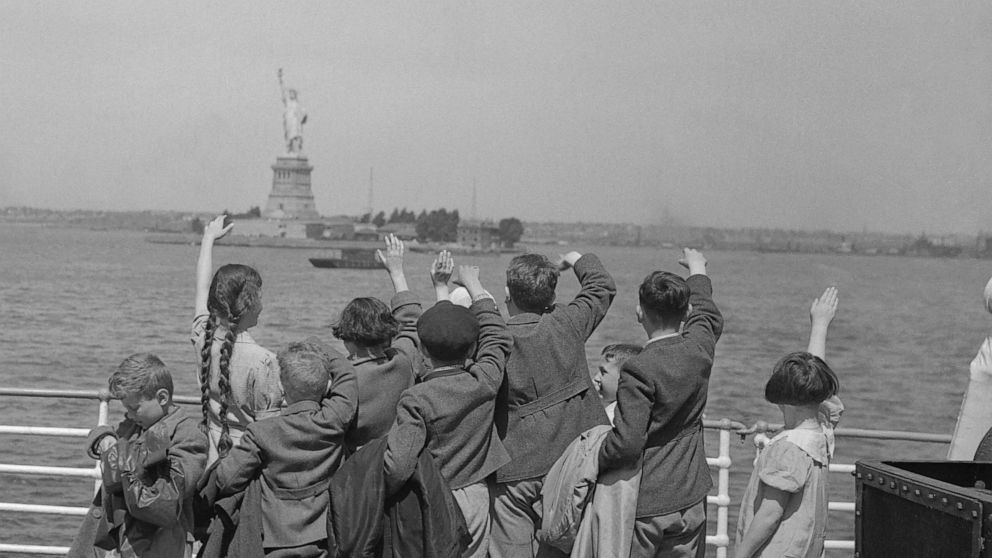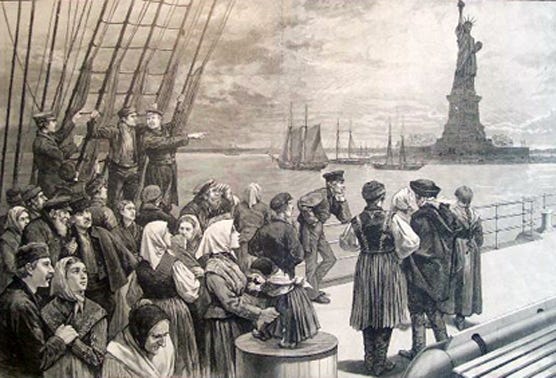The Golden Door
The president of Mexico was incensed. “No good person would do this,” Andrés Manuel López Obrador said at his daily news conference Thursday. “This is inhumane, and no person should be treated like this.”

“This, I believe, is one of the most important sources of America's greatness. We lead the world because, unique among nations, we draw our people, our strength, from every country and every corner of the world. And by doing so we continuously renew and enrich our nation. While other countries cling to the stale past, here in America we breathe life into dreams. We create the future, and the world follows us into tomorrow. Thanks to each wave of new arrivals to this land of opportunity, we're a nation forever young, forever bursting with energy and new ideas, and always on the cutting edge, always leading the world to the next frontier. This quality is vital to our future as a nation. If we ever closed the door to new Americans, our leadership in the world would soon be lost.” - Ronald Reagan’s final speech as president, Jan. 19, 1989

When I met my friend Paul in the Rio Grande Valley, he was doing his best to escape with his family and get back to Austin. Older than me by a little more than a decade, and holding multiple degrees, he found the environment, economy, and level of literacy almost hopeless, and, I think, has never returned in fifty years. I understood but was also intrigued by the Valley. Although we had just arrived as newlyweds and were drawn to the simplicities of daily life on the border, we had no intention of staying long term as I was an ambitious young man, but we knew we would find enjoyment and friends along the Rio Grande. We had no idea some of them would become as family.
I still view the border as a home that I have never been able to completely leave. Our early years as a couple were spent in the Valley and further up the river in Laredo, and, at times, we thought we were living in a modern version of the Wild West that just happened to have electricity and automobiles. Stories were in abundance, though, for a neophyte broadcast journalist in radio and television and my skills were quickly sharpened as we explored a region where two cultures merged into one and the river was viewed as more of a seam than a dividing line.
Almost every weekend we crossed into the border towns of Mexico for dinners and music and shopping and sat the plazas beneath the palms while blizzards roared over our hometowns in the Midwest. Even on our paltry earnings, we could afford to dine in the midst of white-jacketed waiters spinning platters of rum punches and steaming plates of Mexican food that were more exotic than we had ever been able to imagine. Our little commuter car took us wandering backroads of Mexico into villages and we rode the old Aztec Eagle train from Nuevo Laredo over the mountains and through a cold winter night to spend New Year’s Eve in San Miguel Allende. On the American side of the big river, we awoke at the right time of the year to the exquisite smell of orange blossoms out our window and slept on the South Padre beaches as the Gulf pounded rhythmically at our feet. I took long weekend runs that lasted hours beneath the palms and along the canals and quenched my thirst with oranges pulled from branches reaching out almost to the roads’ shoulders.
These memories, accumulated over a little less than five years, created an emotional connection from my youth that I’ve never shed, nor do I want to put them completely into the past. During my reporting years for Houston TV stations, I frequently filed dispatches from the border on issues related to farmworkers, drug cartels, the peso and the impact of the Mexican economy on Texas and the U.S., environmental and health problems, educational challenges, colonias and the depraved living conditions forced on immigrants, maquiladoras, and, yes, hurricanes. These images still knock around in my head in graphic relief, and I spend free time almost five decades later by riding my motorcycle up and down the Rio Grande still trying to have more experiences and to come closer to understanding the dynamics of life on La Frontera’s converged culture.
I suppose these are part of my motivation for constantly writing about the current sadnesses generated on the border by Texas politics and the desperation of migrants. These conditions often align in a manner that compounds the tragedies and emotions caused by inflammatory language and inhumane policies from the governor of Texas and other states, some of them not even on the border. In a sad coincidence this past week, a body was found entangled and floating in the Rio Grande buoys at almost the same time the people of El Paso were dealing with the anniversary of a madman’s slaughter at a Walmart in their city. These needless deaths are not a product of chaos or only policy. They are connected incontrovertibly to words, the rhetoric of politicians like Greg Abbott and Donald Trump, and their ongoing attempts to dehumanize immigrants seeking a better life in the U.S.
When Abbott added buoys, concertina razor wire, and men with guns to the border, blood and death became inevitable. The buoy controversy, downstream from the city of Eagle Pass, only took a few weeks to give up a body. A victim was found entangled in the mesh at the bottom of the round, orange floating balls, on the Mexican side. The governor’s office immediately denied the barrier, which Mexico insists violates international treaties, was responsible for the death. Abbott’s office claimed, without proof, the person died while crossing upstream and the corpse floated south to the buoys. A second body was discovered around the same time in the buoys and turned out to be a 20-year-old Honduran man, according to a report in the Dallas Morning News.
The president of Mexico was incensed. “No good person would do this,” Andrés Manuel López Obrador said at his daily news conference Thursday. “This is inhumane, and no person should be treated like this.”
El Presidente failed to realize that “no good person” was the most accurate descriptive phrase ever used about the Texas governor. Abbott, of course, hid behind a spokesperson and made no public statement. His mouthpiece said, “The Mexican government is flat-out wrong.”
What’s wrong, though, is leaving up dangerous obstacles along the border that are injuring innocents, taking lives, and impeding the Customs and Border Protection (CBP) agents trying to perform their jobs. Abbott seemingly fails to realize Texas is no longer a republic and remains a member of the United States. Neither he nor the legislature has any real sovereign authority to protect the border, a task assigned to the federal government by the Constitution, which empowers Congress to “provide for the common defense” of the nation and led to the creation of CBP and the Department of Homeland Security. Article II, Section 2 of the U.S. Constitution also grants the President the authority to deploy military forces for national defense and border security purposes, if necessary.

Although the Department of Justice has sued Abbott and the state of Texas for violating treaties with Mexico and interfering with the Rivers and Harbors Act, my argument remains that the President needs to send troops to replace National Guard units from Texas, Florida, and, of late, even Nebraska. Republican governors from conservative states continue to use the border as an issue to grandstand and stir up their angry, uninformed voters, most of whom could not run their restaurants, grow their crops, build their houses, or even mow their lawns without immigrants from Mexico. The Cornhuskers have been dispatched to act as additional “eyes” and to report information to Texas authorities or the CBP. Their tour of duty is just 30 days, long enough to get their governor's attention in the local news cycles of Omaha and Lincoln as a tough guy.
Mr. Biden could end this by claiming superseding federal authority, removing the dangerous barriers, and keeping troops on duty long enough to make certain the CBP is no longer being hampered by Texas exhibitions of venality. Abbott would be powerless to intercede, and the President would look more determined in border protection while bringing humanity to the task. Send the Texans home and keep U.S. troops and CBP on the border after they have removed the illegal buoys and the razor wire. Abbott would have a hard time claiming the political optics prove that Biden has an “open border” policy, which is demonstrably and patently absurd. The president has asked Congress to budget an additional $25 billion for CBP and Immigration and Customs Enforcement (ICE) over 2023 levels. Please advise, Mr. Abbott, how, precisely, does that constitute an “open border” policy?
While the border buoys were counting their first casualties, the people of El Paso were remembering what happened to them on the exact same date four years previously when a Dallas gunman walked into a store at their local mall and killed 23 people. The Border Report profiled one of the victims, Arturo Benavides, a man who spent 25 years in the Army, serving his country, and met an improbable end in his hometown Walmart. The people of El Paso see the massacre as an inevitable product of hateful political rhetoric from political leaders like former President Trump and Governor Greg Abbott. The El Paso gunman left behind a manifesto saying he was trying to stop a “Hispanic invasion,” language used frequently by Abbott and his hero, Trump.
“It was not a fortuitous attack,” Fernando Garcia, Director of the Border Network for Human Rights told The Border Report. “It did not materialize out of thin air. At the time, we had a president that fostered hate against immigrants and racism against Latinos and people of color. At the time of the shooting, politicians came to El Paso to say they were going to do something about white supremacism and access to firearms. Four years later, they have done nothing. In fact, Texas is more dangerous now for people of color because of open-carry (firearm) laws and we have a governor who sees migrants as invaders.”
Abbott met with grieving families and community leaders in El Paso after the shooting and promised to impanel a group to look at the gun crisis and make recommendations to increase gun safety. Instead, in the first legislative session after El Paso, Abbott signed into law a permitless carry bill allowing anyone to get a gun and bragged it was the strongest Second Amendment law in Texas history. There is a four-lane highway of deceit and hatred that runs from Abbott’s promises to his actions as governor and that led all the way to the mass shooting at Robb Elementary in Uvalde. The slaughter of 19 children and two teachers and the cowardly response of Abbott’s DPS troopers led to new calls for gun safety measures. Unmoved, the governor traveled that same day by private plane to a political fundraiser for his campaign for reelection while also ignoring calls to cancel his involvement and speech to an NRA convention in Houston a few days later.
My mother was an immigrant. Maybe yours was, too. Or your father. Unless we came from the blood of indigenous peoples who were here when the Europeans arrived, we are all descendants of immigrants. I remember as a reporter attending a national presidential nominating convention when everyone in the assembly hall rose and sang with great enthusiasm Neil Diamond’s song, “Coming to America.” Immigration was celebrated for the source of strength and diversity it has always provided to an evolving and advancing nation. No one is suggesting we stand on the north bank of the Rio Grande and wave undocumented immigrants into this country, but we are demanding policies that express our humanity, respond to the plight of the desperate immigrant, and that speak to an appreciation for the legacy of hope America has offered the world. The “huddled masses” and “wretched refuse” are not gathered on Ellis Island anymore; they are dying in the heat and razor wire and up against floating barriers along our southern reaches.
And the founding principles of these United States are also taking mortal wounds in the unforgiving sun of the Texas border.